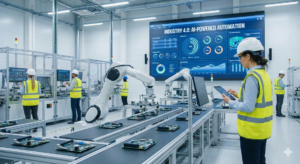Artificial intelligence and cloud computing are a perfect match for businesses.

Artificial intelligence and cloud computing are a perfect match for businesses.
Cloud computing and artificial intelligence (AI) are two of the most paradigm-shifting technologies that are now being used in contemporary businesses. Despite the fact that each has made significant progress on their own, the combination of the two is proving to be particularly effective. Businesses all over the globe are coming to the realization that artificial intelligence (AI) and cloud computing, when combined, provide enormous levels of scalability, efficiency, and intelligence that were previously unfathomable. This synergy is not simply about the ease of technology; rather, it is about allowing firms to innovate more quickly, run more intelligently, and compete more successfully in a market that is always shifting.
In the context of business, the development of cloud computing
The method in which organizations manage their data and apps has been completely transformed by cloud computing. Companies are increasingly using cloud platforms to get access to storage, processing power, and software applications on demand. This is in contrast to the traditional method of depending on their expensive physical infrastructure. This flexibility makes cutting-edge technology available to organizations of all sizes, hence reducing the initial expenses associated with getting it.
At the same time as businesses began moving their workloads to the cloud, they simultaneously started producing extraordinary volumes of data. The urgent need for sophisticated intelligence was established as a result of the management, analysis, and interpretation of this data, and here is where artificial intelligence came into play.
Why Artificial Intelligence and Cloud Computing Are a Perfect Match
Artificial intelligence thrives on data, and the cloud is becoming increasingly where data resides. Consequently, this makes them an ideal match:
- Access to both organized and unstructured data is made available via cloud environments, which provide centralized and scalable access to the data.
- Power for computing: Artificial intelligence algorithms demand enormous amounts of computational resources, which cloud infrastructure is able to provide in an elastic manner.
- Accessibility: Artificial intelligence services may be used by businesses via cloud platforms, eliminating the requirement for in-house AI knowledge.
- Cloud-based artificial intelligence solutions minimize the need for businesses to construct costly local infrastructure, which results in cost effectiveness.
- This synergy makes the deployment of artificial intelligence far more feasible and economical for businesses in a variety of sectors.
Artificial Intelligence Services Provided Via the Cloud
Amazon Web capabilities (AWS), Microsoft Azure, and Google Cloud are just few of the major cloud providers that have directly incorporated artificial intelligence capabilities into their own platforms. As of right moment, companies may leverage:
- To do predictive analytics, machine learning models are used.
- Chatbots, customer service, and sentiment analysis are all examples of applications for natural language processing (NLP).
- In order to recognize images and videos, computer vision technologies are used.
- For the purpose of making decisions in real time, automated data processing.
- dashboards powered by artificial intelligence that provide analytics to monitor performance and trends.
- In order to accelerate innovation, businesses may take use of these pre-built cloud-based technologies rather than constructing artificial intelligence systems from the ground up.
Facilitated Decision-Making and Improvements in Business Intelligence
AI that is hosted in the cloud can convert raw data into insights that may be used. Just one example:
- Retailers have the ability to study the purchasing habits of customers and forecast demand.
- The adoption of predictive maintenance models may help manufacturers cut down on unscheduled downtime.
- Monitoring that is enabled by artificial intelligence enables financial organizations to identify fraud in real time.
- Through the analysis of user behavior, marketing teams are able to customize campaigns on a large scale.
- These more in-depth insights are beneficial to both the process of making strategic decisions and the day-to-day operations.
Allows for scalability and flexibility
The capacity to scale is one of the most significant benefits that comes from merging AI with cloud computing. AI workloads often change based on the project or the amount of data being processed. Businesses are able to enhance their productivity and cost-effectiveness by using cloud platforms, which enable them to flexibly scale their resources up or down.
Examples of businesses that can test artificial intelligence models include startups, who can do so without making a big initial investment, and larger businesses, which can grow their AI capabilities internationally without having to create physical infrastructure.
Efficacy and cost reduction and savings
When artificial intelligence technologies are deployed in the cloud, capital expenses are greatly reduced. When it comes to storage, computing power, or artificial intelligence technologies, businesses pay for exactly what they use. Furthermore, cloud providers are responsible for the maintenance, security, and upgrades of the system, which frees up internal teams to concentrate on innovation rather than doing IT maintenance.
Automation in the Cloud Driven by Artificial Intelligence
Another area where artificial intelligence and cloud computing cross in a strong way is automation. Automation that is powered by artificial intelligence is rapidly being used by businesses for the following:
- Through the use of predictive logistics, supply chain optimization is achieved.
- Chatbots that are intelligent are used to provide customer care.
- It is human resources that utilizes automated screening of resumes.
- Smart audits and compliance monitoring are used to finance the organization.
- The cloud makes it possible to use these automation tools whenever and wherever they are needed, which makes them an essential component of global operations.
Management of Security and Risk Security
When it comes to storing and processing sensitive data on the cloud, security is among the most important concerns. The use of artificial intelligence is beneficial since it can detect abnormalities, identify cyber dangers, and boost compliance processes. In order to offer organizations with a more robust defense against data breaches, cloud providers incorporate cybersecurity technologies that are driven by artificial intelligence and are able to react to changing dangers.
Enabling Collaboration and Working from a Remote Location
AI that is hosted in the cloud also helps contemporary work situations. Tools for collaboration that are powered by artificial intelligence, such as smart scheduling assistants, transcription services, and productivity analytics, are helping to improve the effectiveness of teams as remote and hybrid work arrangements become more commonplace. With the support of intelligent solutions that enhance workflow, businesses are able to function across geographical locations without any disruptions.
Obstacles to Take Into Account
The relationship between AI and cloud computing presents a number of problems, despite the obvious benefits:
- In light of the fact that sensitive information is kept and processed in shared settings, issues about data privacy continue to be a primary concern.
- When a company becomes too reliant on the ecosystem of a single source, this may lead to the phenomenon known as vendor lock-in.
- There is still a dearth of skill, since many firms do not have the in-house experience necessary to fully utilize the potential of AI-cloud solutions.
- If businesses want to extract the greatest amount of value, they need to overcome these obstacles intelligently.
The Prospects for Artificial Intelligence and Cloud Computing in the Business World
In the future, the combination of artificial intelligence and cloud computing will only become more robust. For artificial intelligence applications, advancements such as edge computing, which processes data closer to the location where it is created, will minimize latency. When it comes to balancing their usage of public and private clouds, hybrid cloud solutions will provide enterprises with better flexibility. In addition, as artificial intelligence algorithms get more complex, their demand on tremendous cloud resources will increase.
At the end of the day, artificial intelligence and cloud computing will work together to drive innovation across all industries. This will enable organizations to make more informed choices, provide more tailored experiences for their customers, and open totally new business models.
Not only are artificial intelligence and cloud computing technologies that compliment one another, but they are also intertwined forces that will shape the future of business. Artificial intelligence (AI) converts the cloud into a platform for intelligent decision-making, automation, and creativity. The cloud offers the infrastructure, scalability, and accessibility that AI requires.
In today’s digital-first world, it is no longer a choice for companies to embrace this relationship; rather, it is an absolute must for them to maintain their competitive edge. In terms of efficiency, flexibility, and growth, those that are able to effectively harness the combined power of artificial intelligence and cloud computing will find themselves in a position to dominate.




